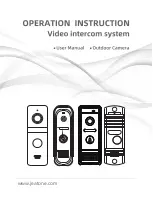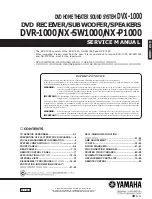
www.pioneerelectronics.com
5
(1*/,6+
),1$/6<67(0$'-8670(176
1. After having turned on the main power switch and having broken-in the speaker, select the correct posi-
tion for the
POWER, either On or Auto depending on your system. The Auto selection will leave the unit
in a self-sensing mode, such that should the unit sense an audio signal it will turn itself on and then shut
down after several minutes without signal, while in the On position the subwoofer always remains on.
Should the system not be used for an extensive period of time, it is recommended that the subwoofer be
unplugged from the AC.
2. Adjust the
VOLUME of your subwoofer so that the volume of your subwoofer matches the overall system
volume. This ensures a smooth transition between the low and high frequencies of your system.
3. Adjust the
FREQ on your subwoofer so that the frequency range of the subwoofer blends well with that
of the front speakers. Setting the crossover too low will create a gap between the frequency response of
the front speakers and that of the subwoofer, while setting the crossover frequency too high will create a
doubling of certain frequencies, making the music sound boomy. When using small satellite speakers,
the appropriate crossover frequency should be from 90Hz to 150Hz, for the bookshelf speakers 70Hz to
90Hz and for the large floor-standing speakers 40Hz to 70Hz.
4. Adjust the
PHASE so that the subwoofer integrates fully with the rest of your audio system. This control
ensures that the subwoofer operates in phase with the rest of the system, as an out of phase subwoofer
will either sound like it is lacking in bass performance or that its timing is off. This setting will be determined
by your listening position, the characteristics of your listening room and its interaction with your subwoofer.
An out of phase speaker means that the speaker cone is moving inwards when it should be moving
outwards, like the other speakers in your system, causing cancellations of certain frequencies. By adjusting
the phase control, one can ensure that all speakers move in the proper direction, at the same time.
5. Steps 2, 3 and 4 might require repeating in order to fine tune your system. Ensuring the proper blending
between the speakers and the subwoofer is critical to the performance of your system, as a whole.






































